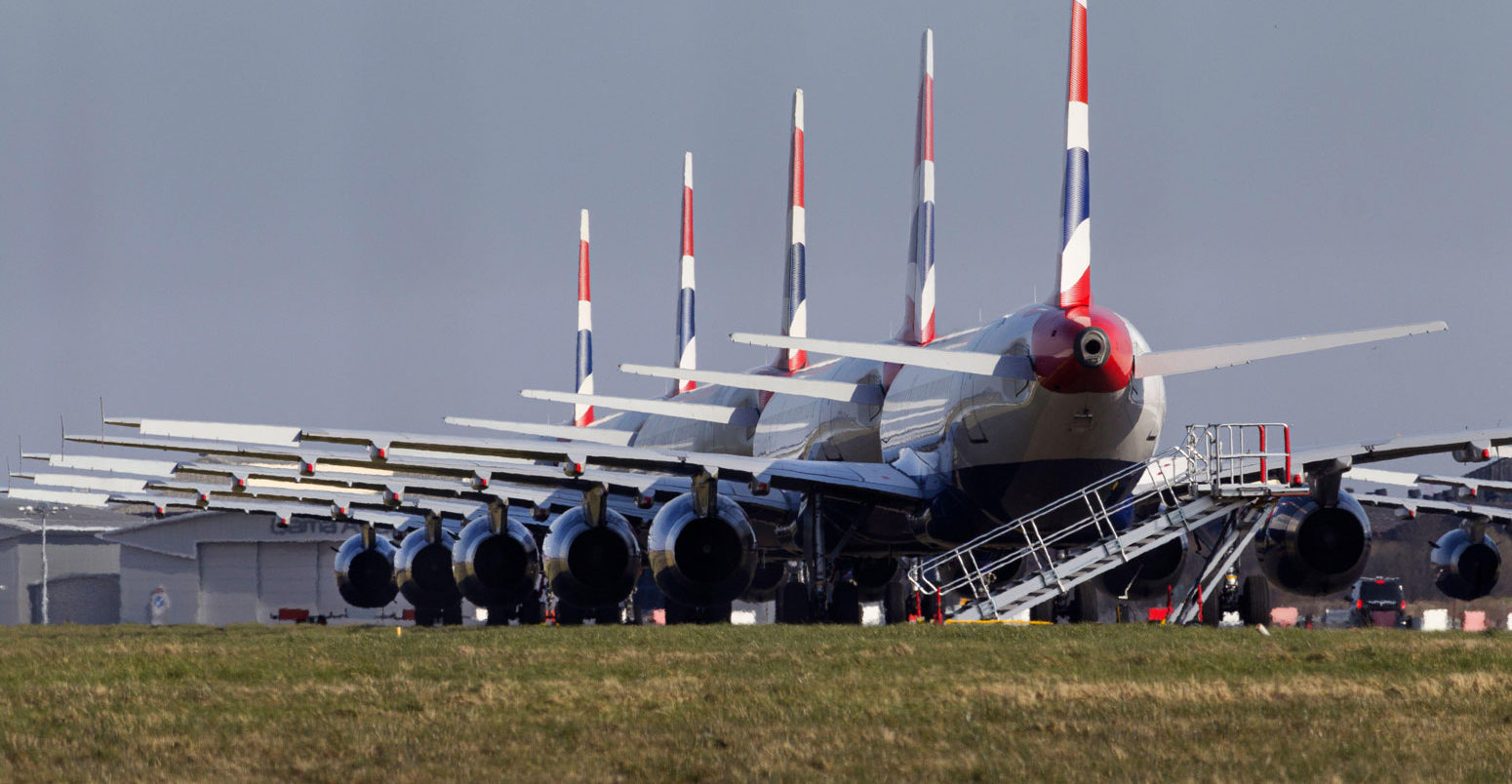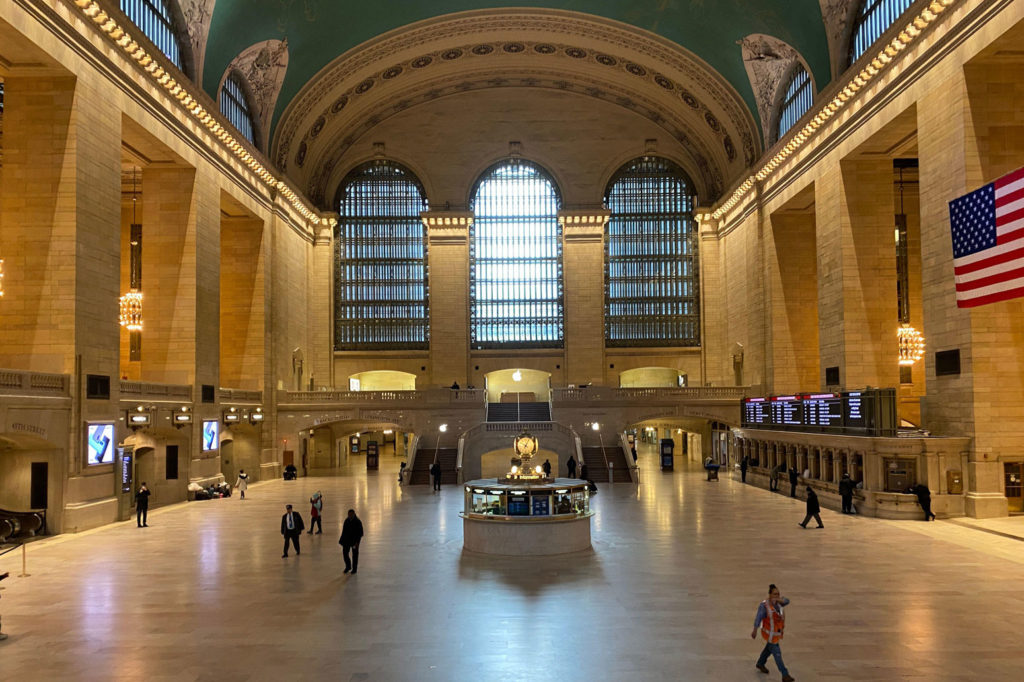
Coronavirus: What could lifestyle changes mean for tackling climate change?
Carbon Brief Staff
03.31.20Carbon Brief Staff
31.03.2020 | 7:00amAs the coronavirus pandemic continues to spread around the world, governments are taking drastic measures to limit the movement of its citizens and shore up shocked economies.
The worldwide lockdown, which has seen approximately three billion people under some form of restriction, has grounded flights, emptied buses and trains, and left private cars sitting on driveways.
The resulting drop in greenhouse gas emissions, as well as air and water pollution, is already making news headlines. But with the pandemic yet to peak in most countries, the wider impacts for a world attempting to slow climate change are still far from clear.
Here, Carbon Brief asks scientists, analysts and policy experts from a range of disciplines for their thoughts on how the lifestyle changes brought about by the Covid-19 pandemic could affect global CO2 emissions in the short and long term.
- Christiana Figueres: “The Covid-19 pandemic has unleashed humanity’s instinct to transform itself in the face of a universal threat and it can help us do the same to create a livable planet for future generations.”
- Dr Glen Peters: “Covid-19 may just demonstrate that solving the climate problem is going to have to focus on solving the technological challenge.”
- Mohamed Adow: “What’s important…is using this opportunity to create better systems and structures that can respond to the climate crisis.”
- Dr Katharine Hayhoe: “Long-term, stimulus packages may hold the key to whether this disaster significantly delays or advances progress on climate.”
- Dr Carl-Friedrich Schleussner: “Even the most stringent responses to the climate crisis would be much less abrupt than what we are seeing now.”
- Prof Mike Berners-Lee: “Covid-19 is a re-evaluation and re-wiring opportunity. It won’t be much fun but it does give humanity an enforced chance to stop and think.”
- Dr Helena Wright: “Given the links between zoonotic diseases and habitat loss, we could see renewed impetus to stop biodiversity loss.”
- Prof Dave Reay: “The climate benefits of a modal shift to online for things like conferences can be big.”
- Dr Joeri Rogelj: “These trillion-dollar measures show once again that if political will is present and society acknowledges the acute need to act, drastic measures can be implemented in a short period of time.”
- Prof Tadj Oreszczyn: “We may look enviously at the co-ordination across government to tackle Covid-19 and the central role of science…But until this plays out and we find what has and has not worked this may be premature.”
- Leo Murray: “Intervening strategically at these moments can help steer people into a lower carbon consumption pattern more seamlessly than trying to prise them out of their existing habits and bring about more lasting reductions in lifestyle emissions.”
- Prof Mark Maslin: “Covid-19 has changed our view of governments and their role in society. By embracing this we can now ensure that win-win solutions are adopted to deal with the climate change emergency.”
- Dr Leah C Stokes: “We may find that this crisis changes our societies in a few ways that lock-in lower carbon emissions. People may start working from home more often and skip work trips.
 Christiana Figueres
Christiana Figueres
Convenor
Mission 2020
Moments of crisis, such as the one we are living, are deeply painful in ways that cannot be underestimated. The social and emotional impacts of Covid-19 will be felt even after we return to normal global health conditions. We will emerge, albeit more slowly, from the unprecedented economic paralysis. The question is how we emerge: whether we return to the ways of the past or whether we derive valuable lessons, to emerge wiser and better equipped to continue to deal with our longstanding emergency of climate change.
The coronavirus tragedy has shown that we are only as safe as the most vulnerable among us and that cross-border threats require global, systemic solutions, as well as individual behaviour changes. Over the past few weeks, governments and businesses have acted swiftly to mandate drastic, but necessary measures to stem the coronavirus, keeping people indoors, grounding air travel, cancelling events and closing borders. Citizens, equally, are uniting to shift their behaviour en masse, by working and teaching their children from home, washing their hands more frequently, protecting the elderly, and helping neighbours shop for food.
The same decisive spirit is needed in the climate crisis. We need both significant government policies and important personal behaviour changes. Governments will need to intentionally design economic recovery packages that support the most vulnerable and promote innovation and clean technologies as the moving force of the economy, while removing subsidies from polluting industries. Businesses will need to decarbonise their operations and investors their portfolios. Individuals will need to change their diets, consumption patterns and travel behaviour. We have learned that every person’s individual effort actually does count.
The Covid-19 pandemic has unleashed humanity’s instinct to transform itself in the face of a universal threat and it can help us do the same to create a livable planet for future generations.
(Figueres is the former executive secretary of the UNFCCC. She is also co-host of the podcast Outrage and Optimism and co-author of The Future We Choose.)
 Dr Glen Peters
Dr Glen Peters
Research director
Center for International Climate and Environmental Research (CICERO)
Covid-19 is going to mean a significant short-term drop in emissions, but how deep and how long is highly uncertain. The crisis in Europe is barely a month old. Projections made just two weeks ago are likely outdated – even mine.
Each new day brings more data on the magnitude of the changes. There will be many more emission estimates in the weeks and months ahead, using increasingly innovative methods. Many scientists will also benefit from an unprecedented real-time experiment, virtually turning off aviation emissions overnight and drastic reductions in air pollution in and around cities. We will have real data on the effects of working remotely, which could unfortunately be a bad experience for many if lockdowns last for months.
The most relevant question, really, is: what are the long-term effects? Once Covid-19 passes, society is likely to shift back to some form of normality. Private transportation will pick up and, in a worst case, could even exceed pre-Covid-19 levels if people are worried about health risks. Aviation emissions may stay low for years, as people prefer local tourism either to support local industries or avoid health risks. Industrial production and electricity generation are likely to move back to pre-Covid-19 levels.
Time will tell if government stimulus will lead to a sudden rebound in emissions, such as after the global financial crisis, or more of a slow recovery like after the oil crises. Much will be written about how to make economic stimulus climate friendly, but the Covid-19 crisis has different characteristics to others. Much of the stimulus may flow to support and stimulate the heavily affected service sectors.
If clean-energy projects can be kept moving throughout the crisis, while fossil industries are more heavily impacted and move backwards, then it may be that clean energy rebounds strongly and we find that 2019 was the year of peak emissions. Though, a long and slow recovery, over the space of a few years, will also make tracking progress on climate policy difficult – will it be possible to separate the effects of a weak economic recovery versus strong growth in renewables on CO2 emissions?
Many have tried to draw analogies between Covid-19 and climate. The most interesting may be the role of individual behaviour versus technology. After Covid-19 passes, we will be able to see what a mass and unpleasant shutdown of society means in terms of emission reductions. Hopefully, most will agree, a lockdown is not the best way to reduce emissions.
Given the magnitude of the changes in society, the size of the emission reductions may be disappointing. The solution to Covid-19 may also be a technological one, a vaccine. While individual action and behavioural change play important roles for climate, Covid-19 may just demonstrate that solving the climate problem is going to have to focus on solving the technological challenge.
 Mohamed Adow
Mohamed Adow
Director
Power Shift Africa
The main change to people’s lifestyles may be that many people ditch the daily commute and realise working from home, for those able, is actually quite enjoyable rather than fighting the traffic in rush hour. The saved money – and emissions – would be a nice bonus.
It’s also possible that people realise the harmful business flight is an unnecessary use of time and resources when teleconferencing calls are actually a pretty good replacement for most meetings. The financial savings for organisations would be considerable, not to mention the time saving and lack of needing to book accommodation.
What’s important, though, is using this opportunity to create better systems and structures that can respond to the climate crisis.
 Dr Katharine Hayhoe
Dr Katharine Hayhoe
Director
Climate Science Center, Texas Tech University
Short-term, it is clear that the coronavirus pandemic is slashing air pollution. Some of the world’s most polluted cities are experiencing clearer skies and cleaner air than they’ve seen in decades. The reduction in industrial pollution and transportation is also cutting carbon emissions. But, as we are already seeing in China, once the crisis passes, transportation and industrial production, and their associated emissions, are ramping right back up again.
Long-term, stimulus packages may hold the key to whether this disaster significantly delays or advances progress on climate. As James Temple discusses in the MIT Technology Review, free-falling oil prices, disruptions in the supply chain for renewable energy technology, and simply our limited capacity to cope with multiple crises at one time could all put climate action on hold. And that’s why the recovery plans are so key: will they move us forward into the future, or back into the past?

An almost empty Grand Central Terminal, New York City, 21 March 2020. Credit: David Grossman / Alamy Stock Photo
 Dr Carl-Friedrich Schleussner
Dr Carl-Friedrich Schleussner
Head of climate science and impacts
Climate Analytics
The narrative that the economic catastrophe caused by the coronavirus is “good” for the climate is dangerously misleading and could undermine support for climate action. Tackling the climate crisis is about decoupling wealth and growth from emissions and ensuring a sustainable future for all, not economic decline. 2020 is a key year for political action on climate change with new and updated NDCs [nationally determined contributions] to be submitted this year. Those are urgently needed in order to close the emissions gap.
With governments rightly focused on the crisis at hand, it seems unlikely that the political momentum can be generated to achieve that task – it might even be that COP26 needs to be postponed.
On the other hand, there are also some at least encouraging lessons here. Stringent government action based on science is key to address this collective crisis. This is the kind of action that we also require to address the climate emergency – noting that even the most stringent responses to the climate crisis would be much less abrupt than what we are seeing now.
Lastly, the design of government action to recover from this crisis will probably require scales unprecedented since the post-war period. If these are being used wisely, this health crisis can be a turning point in the global response to climate change. Hope they can still be of use.
 Prof Mike Berners-Lee
Prof Mike Berners-Lee
Professor
Lancaster Environment Centre, Lancaster University
Short-term, there will be a big cut in global emissions, but that won’t in itself be all that useful in dealing with the climate emergency – just delaying things by a few months at most.
Much more importantly, Covid-19 is a re-evaluation and re-wiring opportunity. It won’t be much fun but it does give humanity an enforced chance to stop and think – and to choose how we rebuild. We have to think about how we can come out of this in such a way that gets the transition to low carbon and sustainable living underway at last. Could be a key moment for climate response if we use it.
 Dr Helena Wright
Dr Helena Wright
Vice president, sustainable infrastructure and energy finance
WWF Singapore
Given the links between zoonotic diseases and habitat loss, we could see renewed impetus to stop biodiversity loss at the [15th conference of the parties of the] UN Convention on Biological Diversity this year. In terms of emissions, it is important not to over-emphasise short-term impacts on reducing emissions without being mindful of social and economic impacts.
Dealing with the long-term climate emergency will not come from shutting down the economy as coronavirus has done, it will come from restructuring systems to enable people to live in a low-carbon way, such as investing in sustainable infrastructure.

Closed markets and empty roads in West Bengal, India, 22 March 2020. Credit: Soumen Tarafder / Alamy Stock Photo
 Prof Dave Reay
Prof Dave Reay
Chair in carbon management & education
University of Edinburgh
Transport emissions immediately come to mind as our skies empty. Certainly global emissions from the aviation sector will fall radically over the coming months and it could well be that the current surge in virtual meetings will help them become the new “norm” for many work collaborations in the future.
The climate benefits of a modal shift to online for things like conferences can be big. The online meeting tech is now really good and global accessibility has skyrocketed – we already run many of our international Masters programmes at Edinburgh wholly online.
Many millions of us are now finding that we can successfully attend international meetings from our kitchen tables, with the added spice of random cat, dog and child interruptions. Obviously, we will, at some point, go back to using planes again, but my expectation is that we will also be using alternatives like virtual meetings a whole lot more.
A form of “transport” that may never recover is, I suspect, luxury cruises. By definition they are avoidable, and their emissions of CO2 and other air pollutants per passenger kilometre can be truly eye-watering (pdf) – several hundred or even several thousand grams of CO2 per passenger km, compared to around 100g CO2 per passenger km for flights and less than half that for international rail travel (pdf).
 Dr Joeri Rogelj
Dr Joeri Rogelj
Lecturer in climate change and the environment
Grantham Institute for Climate Change at Imperial College London
The Covid-19 crisis is a human tragedy and in that sense a clear lesson for humanity to not overestimate the resilience of our global society to external shocks. Many have already commented on the opportunity created by the ongoing efforts of governments to counteract the fallout of the pandemic and the movement restrictions to contain it.
These trillion-dollar measures show once again that if political will is present and society acknowledges the acute need to act, drastic measures can be implemented in a short period of time. This provides important lessons about the feasibility of implementing the drastic climate mitigation measures that would be required to have a decent chance of limiting global warming to safe levels.
Directing the current economic and societal support efforts by governments in sustainable directions is not only an opportunity, but, in essence, a rational necessity for survival, as recently also suggested by International Energy Agency head Fatih Birol.
The Covid-19 experience will also teach us lessons about the limitations of implementing very drastic behavioural changes in people’s everyday lives for a long period of time. If lessons are indeed learned from our current crisis situation, these can in turn inform future policies for the better.
 Prof Tadj Oreszczyn
Prof Tadj Oreszczyn
Professor of energy and environment
The Bartlett School of Environment, Energy and Resources, University College London
To tackle the current Covid-19 challenge, governments are imposing unprecedented behavioural change, much of which impacts energy use. In the UK, we shifted our work activities, closed our schools, community centres and places of worship, and are closing our restaurants, bars and pubs – a much beloved British institution, with more to come.
This behavioural and financial change would have been considered politically unacceptable even a few days ago. Today’s actions have clearly resulted in CO2 and pollution emissions reductions, but at a great economic and societal cost.
As energy researchers – not medics – perhaps the only useful thing we can do is to seek to draw some conclusions from one crisis and then try to tackle a completely different longer-term climate crisis. We desperately seek to compare policy responses to Covid-19 with the climate change emergency and look for synergistic opportunities. We may look enviously at the co-ordination across government to tackle Covid-19 and the central role of science – just tell us what to do and we will do it. But until this plays out and we find what has and has not worked this may be premature.
So, what should energy researchers do? The global research community are and will continue to study these changes and draw insights from them. We at UCL are utilising a variety of tools, including energy system models, smart-meter data, social surveys and national databases to understand the shifting drivers during this transition. When we emerge from the Covid-19 crises – and following what is still an unprecedented rate of change – we need to consider how the UK’s future carbon emissions will shape and be shaped by the “new-normal”.
 Leo Murray
Leo Murray
Director of innovation
Possible
Coronavirus is not a solution to climate change. In both the short- and long-term, people are going to be dealing with the many challenges that Covid-19 is throwing at us, from the tragic loss of loved ones to profound economic concerns. This is likely to be at the forefront of people’s minds and will pattern their behaviour for a while to come. It’s important we all start from that position.
Those of us who work on the zero-carbon transition know that getting consumers in rich nations to shift to more sustainable lifestyles is incredibly difficult, even at the best of times.
- IEA: ‘Green’ coronavirus recovery would keep global emissions below 2019 peak
- Coronavirus: Tracking how the world’s ‘green recovery’ plans aim to cut emissions
- Webinar: What impact is Covid-19 having on global CO2 emissions?
- Q&A: Could climate change and biodiversity loss raise the risk of pandemics?
- Analysis: Coronavirus set to cause largest ever annual fall in CO2 emissions
- Coronavirus: What could lifestyle changes mean for tackling climate change?
- Analysis: Coronavirus temporarily reduced China’s CO2 emissions by a quarter
The academic literature essentially concludes that almost all forms of direct entreaty or psychological nudge to individuals to voluntarily change their behaviour to combat climate change do not work, or at best have very limited impacts. Substantially changing behaviours requires, as a general rule, structural changes to the choice architecture in which individual consumers make decisions, such as regulations to ban certain products or activities, or large price hikes, or new infrastructure.
But there is one type of intervention that jumps out of the behaviour-change research as unusually effective: targeting “moments of change” like moving house or job where our patterns of behaviour are disrupted and we cannot simply rely on habit. In such moments, individuals are required to make new, active choices and subsequently may establish new patterns of consumption in the future. Intervening strategically at these moments can help steer people into a lower carbon consumption pattern more seamlessly than trying to prise them out of their existing habits and bring about more lasting reductions in lifestyle emissions.
The coronavirus pandemic represents an utterly unprecedented global “moment of change”, in which the regular patterns of hundreds of millions of people’s lives have been forcefully interrupted, not just as individuals, but as part of local and global communities. This mass instance of “habit discontinuity” is most pronounced in the area of personal mobility, precisely the area of consumption behaviour that has so far proven most difficult to shift.
If we as a society are sincere in our recognition of the climate crisis as an emergency and serious about mounting an emergency response, there could be real potential for the future global recovery from Covid-19 to leave overall mass travel behaviour in a radically different pattern to where it started.
Then again, perhaps not. We also know from research that the transition moment of becoming a parent is not necessarily the best one to be pushing sustainability. New parents may feel environmental concern especially strongly, but they also have many other challenges and immediate concerns to contend with. The same could be true for everyone coming out of lockdown, questioning their old lives and keen to make better ones but also having to deal with huge economic challenges as well as grief and the other mental health impacts of this crisis.
 Prof Mark Maslin
Prof Mark Maslin
Professor of climatology
University College London
Covid-19 in the short-term is radically altering our lifestyle. It is also significantly dropping our global carbon emissions through reduced transportation, reduced industrial output and reduced non-essential consumption. It is not a model of how to deal with the long-term systemic issues of climate change. But it does offer major insights into how we can collectively deal with climate change.
Since the 1980s there has been a move away from government regulation and general support for society. This shift has varied between countries, but can be seen everywhere. This has led to whole generations accepting the idea that markets and business know best because they are supposedly more efficient than anything organised by governments. But what Covid-19 dramatically illustrates is that markets, business and industry – though essential for our modern life – structurally do not act in everyone’s best interests. Governments have the critical central role in maintaining our health and safety especially in times of crisis.
Government incentives, policies, nudges, taxation, regulation and enforcement can shape society to ensure the best outcomes. So we need to harness this new acceptance of government dominance of our lives and shift national and global economies to a more sustainable footprint. If done properly, it will also help us deal with the next pandemic.
For example, shifting to localised renewable energy increases energy security. Removing fossil-fuel subsidies provides trillions of extra dollars for our health systems. Dramatically decreasing meat consumption increases human health and reduces the chance of zoonosis and, thus, new pandemics developing. Instigating a “universal basic income” has been shown to reduce non-essential consumption and also protects the economy from the next pandemic as everyone will have enough money to live on, however long social distancing must be maintained.
Covid-19 has changed our view of governments and their role in society. By embracing this we can now ensure that win-win solutions are adopted to deal with the climate change emergency.
 Dr Leah C Stokes
Dr Leah C Stokes
Assistant professor
Bren School of Environmental Science & Management, University of California, Santa Barbara
With so many people staying at home, it’s not surprising that carbon emissions will also fall precipitously this year. But this is not the structural change that is necessary to break our dependence on fossil fuels. Long-term emissions reductions will require government policy to clean up our electricity system, increase electric vehicles and retrofit our homes away from burning fossil gas. These changes will take more than short-term behaviour changes.
That said, we may find that this crisis changes our societies in a few ways that lock-in lower carbon emissions. People may start working from home more often and skip work trips. In my own case, I’ve spent the last few weeks leaning into my already productive backyard garden. And if the seed companies’ websites are any indication, it seems that millions of other people are turning towards growing food in their own backyards. That’s just a small piece of the puzzle when it comes to tackling the climate crisis, but it’s a glimmer of hope in a dark time.
-
Coronavirus: What could lifestyle changes mean for tackling climate change?

